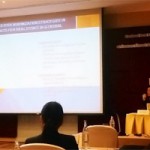Category: Business in Thailand
Presentation to UN Employees Retiring in Thailand
Siam Legal’s managing partner, Kert Stavorn, was invited to speak to a group of United Nations employees Tuesday regarding legal considerations for foreigners retiring in Thailand. He spoke for over one hour concentrating his presentation on the following issues: retirement visas, owning property in Thailand, fund remittance and taxes, estate planning, and investing. On the […]
The Thailand Real Estate Investment and Property Law Forum 2013
Asia Business Connect held the “Thailand Real Estate Investment and Property Law Forum 2013” conference at the Bangkok Convention Center last September 19th to September 20th. Mr. Kert Stavorn, a partner at Siam Legal International, gave a presentation regarding “Contract Strategies and Legal Concerns in Sales/Property Contracts for the Real Estate Business” and also sat […]
Specific Business Tax in Thailand
Businesses in Thailand that provide goods and services are generally subject to the Value Added Tax (VAT), which is an indirect tax and is levied against the value received or receivable from the supply of goods and services. However, certain types of businesses under the Revenue Code are subject to the Specific Business Tax (SBT), […]
ASEAN Comprehensive Investment Agreement
On 26 February 2009, the economic ministers of the ten ASEAN member States signed the ASEAN Comprehensive Investment Agreement (the “ACIA”), which liberalized trade within ASEAN in the following fields: Agriculture Fishery Forestry Mining Manufacturing Pursuant to the terms of the ACIA, ASEAN nationals are able to operate foreign majority-owned firms in Thailand by […]
Company Liquidation: Closing a Thai Limited Company
In the previous articles, we addressed the legal bases provided by the Civil and Commercial Code, passing a special resolution, and actual procedure for registering the dissolution of a Thai company. In this last series about closing a Thai Limited Company, we will explain the last stage in the process, which is company liquidation. Liquidation […]
Closing a Thai Limited Company
The closing of a Thai limited company is a very involved procedure that requires assistance from both a lawyer and an accountant. Furthermore, if a company has accumulated much debt during the course of its business operations, it may take a while before the company can settle its affairs and come to a close. Basically, […]


















